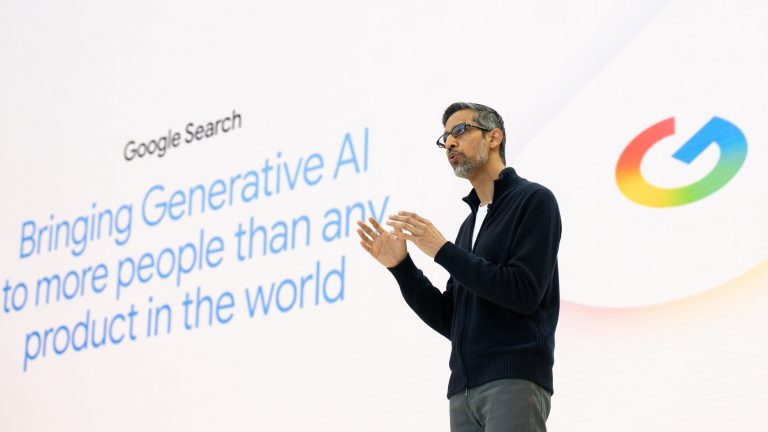
Alphabet and Google CEO Sundar Pichai delivered a sweeping keynote at the 17th annual Google I/O developer conference on Tuesday, casting a clear message: artificial intelligence isn’t just an add-on—it’s becoming the foundation of Google’s entire ecosystem.
“We are shipping faster than ever,” Pichai said, highlighting that Google has announced over a dozen new models, made research breakthroughs, and launched more than 20 major AI products and features since last year’s I/O. Leading the pack is Gemini 2.5 Pro, which Pichai claimed now sweeps the LLMArena leaderboard in all categories, cementing its place as a leading large language model globally.
But beyond performance metrics, Pichai’s address signaled a profound shift in how users interact with Google’s core products—from Search and Gmail to Google Docs and Meet. Gemini, once a model, is now the thread running through the company’s ambitions, with AI woven deeply into the user experience.
Register for Tekedia Mini-MBA edition 19 (Feb 9 – May 2, 2026).
Register for Tekedia AI in Business Masterclass.
Join Tekedia Capital Syndicate and co-invest in great global startups.
Register for Tekedia AI Lab.
Gemini Replaces Traditional Search, Gains “AI Mode”
Perhaps the boldest shift is Google’s new AI Mode in Search, a feature that’s currently rolling out under Google Labs. Billed as a “total reimagining” of the Google search experience, AI Mode offers an “end-to-end” AI-driven interface. Rather than presenting links and snippets, this new mode integrates directly with Gemini 2.5 and a user’s personal data to generate tailored responses.
“For those who want an end-to-end AI search experience, we are introducing an all-new AI mode,” Pichai said.
While Google has long dominated web search, this move reflects growing pressure from AI-native services like Perplexity AI, ChatGPT, and others that offer direct, conversational answers instead of traditional search results. But the shift raises critical questions—particularly about the potential impact on web traffic for publishers and businesses who rely on referrals from Google. For now, Google is rolling it out gradually and hasn’t disclosed plans for wider implementation.
Gemini Will Soon Know You—Really Know You
A centerpiece of Google’s AI vision is “Personal Context”, a controversial new feature that allows Gemini to scan across a user’s Google apps—Gmail, Drive, Docs, Calendar—to understand routines, preferences, tone of communication, and even vacation history.
“With your permission, Gemini models can use relevant context across your Google Apps, in a way that is private, transparent and fully under your control,” Pichai said.
One application of this is Personalized Smart Replies. These go beyond the existing short auto-responses by drawing from a user’s own documents and communication history to draft longer, more personalized messages.
To demonstrate, Pichai offered an example: a friend asking for travel advice. Rather than writing a fresh reply, Gemini would comb through your past trip notes, reservations, and email tone, and generate a message that mimics how you typically write—making it appear like you wrote it yourself.
Some see convenience; others see something far more dystopian.
“Gemini matches my typical greetings, captures my tone, style, and favorite word choices… and automatically generates a reply,” said Pichai. While aimed at boosting productivity, critics argue this approach risks devaluing human communication, blurring the lines between genuine interaction and machine-generated mimicry.
The feature is expected to roll out to Gmail subscribers this summer.
Real-Time Translation, AI in Meetings, and SynthID
On a more promising front, Pichai introduced real-time bi-directional voice translation during video calls using Project Starline—a futuristic video conferencing initiative. The feature is now integrated into Google Meet for English and Spanish, with plans to expand to more languages soon. Powered by AI-generated speech, the tool enables live conversations across language barriers, with an avatar voicing translations instantly.
Meanwhile, in an almost self-aware nod to AI overload, Google also launched SynthID Detector, a web tool that helps users identify whether content has been AI-generated. The feature will support detection for text, audio, images, and video.
Given the rise of AI-generated misinformation and deepfakes, SynthID aims to bring some level of transparency, though skeptics are already wondering: will users now need to run their friends’ emails or texts through AI detectors to check if they were written by a person or a machine?
Big AI Vision, Bigger Risks
Tuesday’s announcements confirm that Google sees Gemini not as a tool, but as the interface of the future. It’s set to power your email replies, search results, translations, and even social conversations.
But the company’s AI push also raises critical questions about privacy, data use, authenticity of communication, and Google’s responsibility in shaping the very fabric of digital interaction. While Pichai stressed user consent and transparency, the move toward deeply personalized AI inevitably brings trade-offs—between convenience and control, between speed and sincerity.
However, one thing is clear: Google is betting that users will embrace a world where machines speak like us, think like us, and even write for us. Time will tell whether that vision empowers or alienates users.



